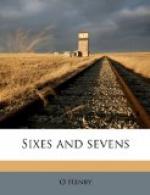“Doctor, I have cirrhosis of the heart, indurated arteries, neurasthenia, neuritis, acute indigestion, and convalescence. I am going to live on a strict diet. I shall also take a tepid bath at night and a cold one in the morning. I shall endeavour to be cheerful, and fix my mind on pleasant subjects. In the way of drugs I intend to take a phosphorous pill three times a day, preferably after meals, and a tonic composed of the tinctures of gentian, cinchona, calisaya, and cardamon compound. Into each teaspoonful of this I shall mix tincture of nux vomica, beginning with one drop and increasing it a drop each day until the maximum dose is reached. I shall drop this with a medicine-dropper, which can be procured at a trifling cost at any pharmacy. Good morning.”
I took my hat and walked out. After I had closed the door I remembered something that I had forgotten to say. I opened it again. The doctor had not moved from where he had been sitting, but he gave a slightly nervous start when he saw me again.
“I forgot to mention,” said I, “that I shall also take absolute rest and exercise.”
After this consultation I felt much better. The reestablishing in my mind of the fact that I was hopelessly ill gave me so much satisfaction that I almost became gloomy again. There is nothing more alarming to a neurasthenic than to feel himself growing well and cheerful.
John looked after me carefully. After I had evinced so much interest in his White Orpington chicken he tried his best to divert my mind, and was particular to lock his hen house of nights. Gradually the tonic mountain air, the wholesome food, and the daily walks among the hills so alleviated my malady that I became utterly wretched and despondent. I heard of a country doctor who lived in the mountains nearby. I went to see him and told him the whole story. He was a gray-bearded man with clear, blue, wrinkled eyes, in a home-made suit of gray jeans.
In order to save time I diagnosed my case, touched my nose with my right forefinger, struck myself below the knee to make my foot kick, sounded my chest, stuck out my tongue, and asked him the price of cemetery lots in Pineville.
He lit his pipe and looked at me for about three minutes. “Brother,” he said, after a while, “you are in a mighty bad way. There’s a chance for you to pull through, but it’s a mighty slim one.”
“What can it be?” I asked eagerly. “I have taken arsenic and gold, phosphorus, exercise, nux vomica, hydrotherapeutic baths, rest, excitement, codein, and aromatic spirits of ammonia. Is there anything left in the pharmacopoeia?”
“Somewhere in these mountains,” said the doctor, “there’s a plant growing—a flowering plant that’ll cure you, and it’s about the only thing that will. It’s of a kind that’s as old as the world; but of late it’s powerful scarce and hard to find. You and I will have to hunt it up. I’m not engaged in active practice now: I’m getting along in years; but I’ll take your case. You’ll have to come every day in the afternoon and help me hunt for this plant till we find it. The city doctors may know a lot about new scientific things, but they don’t know much about the cures that nature carries around in her saddlebags.”




